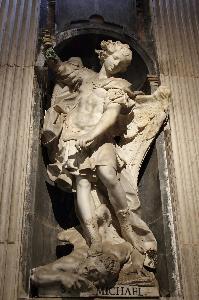Giovanni Battista Maino
Giovanni Battista Maino;Giovanni Battista Maini
Mjesto: Cassano Magnago
Rođen: 1690
Smrt: 1752
Biografija:
Giovanni Battista Maini, also known as Giovanni Battista Maino, was a renowned Italian sculptor of the Late-Baroque period, active mainly in Rome. Born on February 6, 1690, in Cassano Magnago, Lombardy, and died on July 29, 1752, in Rome, he left an indelible mark on the art world.
Early Life and Training
By 1708, Maini had moved to Rome, where he joined the large studio of Camillo Rusconi, working for over twenty years. This apprenticeship played a significant role in shaping his skills as a sculptor. He may have had contacts with Foggini in Florence, which would have exposed him to various artistic styles and techniques.
Notable Works
Maini collaborated in the decoration of the spandrels of the cupola of the Santi Luca e Martina. He worked on the papal funerary monument to Innocent X (1729), likely based on Rusconi’s designs. For St. Peter’s Basilica, Maini carved large marble statues of St Francis of Paola (1732) and St Philip Neri (c. 1735). This was part of a series of sculptures on the founders of orders, including Michelangelo Slodtz's St Bruno. He also completed the Archangels Michael and Gabriel statues (c. 1737) for the basilica of Mafra, commissioned by the king of Portugal.
Artistic Style and Contributions
Maini's work was characterized by a deep understanding of the Late-Baroque style, which emphasized dramatic lighting, intense emotions, and highly detailed sculptures. His collaboration with Camillo Rusconi and his work on various projects in Rome demonstrate his skill as a sculptor. The Corsini chapel in San Giovanni in Laterana, where he worked on the benedictory bronze statue of Clemente XII, showcases his mastery of the medium. Key aspects of Maini's work include:
- His use of marble and other materials to create intricate details.
- His collaboration with prominent artists of the time, such as Camillo Rusconi.
- His contributions to the decoration of various churches and basilicas in Rome.
Legacy
Giovanni Battista Maini's legacy can be seen in his numerous works, which continue to inspire artists and art enthusiasts alike. His sculptures, such as St Francis of Paola and St Philip Neri, are testaments to his skill and dedication to the craft. As a prominent figure in the Late-Baroque period, Maini's work continues to be celebrated and studied by art historians and enthusiasts. For more information on Giovanni Battista Maino and his works, visit https://Wikioo.org or explore the Corsini chapel in San Giovanni in Laterana.







